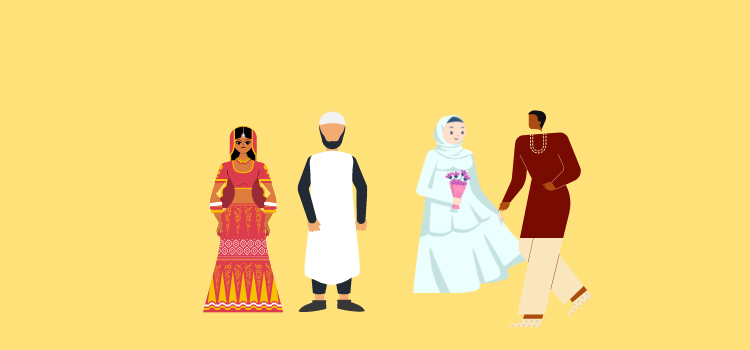Harmonizing Differences: Exploring Hindu Muslim Marriage Dynamics
Posted On : April 10, 2024

Table of Contents
Introduction
It goes without saying that both Muslims and Hindus in the country have a negative attitude towards interfaith unions. The main concern is not people's personal aversion to Hindu-Muslim marriages, but the legal consequences of such unions. Both Hindu and Muslim marriage laws invalidate marriage with a non-religious person.
Special Marriage Act, 1954
Special Marriage Act, 1956 gives some legal recognition to persons who marry between Hindus and Muslims. This Act does not supersede the specific provisions of Islamic and Hindu law. If one of them does not convert, married couples are still subject to their religious laws. The purpose of this law is to resolve common legal or marital problems that arise in interfaith marriages.
Requirements of the Special Marriage Act
Note that the Special Marriage Act does not recognize every marriage. According to the law, you must meet the following requirements to get married:
- The ritual or ceremony; marriage is a civil contract.
- There cannot be another legal marriage in which both parties participate.
- The parties must be competent to give legal consent to the union and must not be mentally incapacitated.
- The groom must be 21 years old, while the bride must be at least 18 years old.
What is the Special Marriage Act, 1954?
India's Special Marriage Act, 1954 (SMA) provides a framework for marriage between persons belonging to different castes or religions. It regulates civil marriage, meaning that the union is sanctioned by the state, not by religion. The UK Marriage Act 1949 and the Indian system, which recognizes both civil and religious marriages, are comparable legal frameworks.
Some key provisions of the Special Marriage Act 1954 are as follows.
Applicability
All people of Indian faith are covered according to the law including Christians, Muslims, Sikhs, Hindus, Jains and Buddhists.
Recognition of marriage
According to the law, marriages must be registered to be legally recognized. This registration provides a number of legal benefits and guarantees to spouses, including social security, inheritance and inheritance rights.
It prohibits polygamy and annuls a marriage if one spouse cannot legally consent to the marriage for mental reasons such as disability or if one of the parties had a spouse living at the time of the marriage.
Written notification
Section 5 of the Act requires the parties to notify the county marriage officer in writing and at least one of the parties must be alive in the district at least 30 days before the date of notification. Anyone can marry before 30 days of notification in accordance with Section 7 of the Act.
Age Requirement
According to the SMA, a person must be at least 21 years old for men and 18 for women to marry.
Personal Laws differences
Personal laws such as the Indian Marriage Act (1955) and the Muslim Marriage Act (1954) which prohibit changing spouses before marriage. But the SMA allows inter-religious or inter-caste marriages without the partners converting to another religion or renouncing their religious identity. However, according to inheritance rights, a person is considered separated from the family if they joined the SMA.
Conclusion
Wives are not entitled to inheritance benefits according to their own laws if they use a special marriage, which is often a convenient last resort for Hindu-Muslim couples. This is often a bad situation, especially for a child born out of wedlock. Therefore, partners in an interfaith marriage are likely to face the problem of accepting another religion, if only for the sake of their children, no matter how liberal and positive they may be. If you want to know more about this topic, we recommend that you consult a family lawyer.
Frequently Asked Questions
- Can a Muslim marry a Hindu?
Generally, a Muslim is allowed to marry a Hindu woman. However, the Quran tells Muslim men not to marry non-Muslim women. - Is interfaith marriage safe in India?
In India, civil or special marriages, also called interfaith unions, are allowed. According to the Supreme Court decision, adults are free to choose their life partner regardless of caste or creed. - Do interfaith marriages work?
If both spouses are willing to put in a lot of effort to commit to each other, treat each other with respect and focus on their shared values, interfaith marriages can work. - What are India's Islamic rules on marriage?
It is essential that the proposal and acceptance be expressed one before the other. According to Sunni law, the proposal and acceptance must be made in front of two sane Muslim adult witnesses or one male witness and two female witnesses.
























